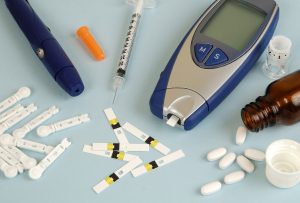Diabetes mellitus (laboratory diagnostics)

Diabetes mellitus is a group of endocrine diseases that develop due to a lack of the hormone insulin, which leads to an increase in the level of glucose (sugar) in the blood.
Tests for the diagnosis of diabetes in MedLab:
comprehensive study for primary diagnosis: CI5 Diabetes
Biochemical tests:
Serum sugar (glucose) and plasma sugar (glucose). Glucose is the main carbohydrate that, when oxidized, provides energy to all cells of the body. With a constantly elevated level of glucose in the blood, vascular disorders and many other pathologies are possible.
Urine for sugar. Glucose in the urine is found with an increased content of glucose in the blood and kidney pathologies.
Fructosamine is a product of the reaction of glucose with amino acids of proteins, which allows for a retrospective assessment of blood glucose levels over the past 2-3 weeks.
Glycosylated hemoglobin (HbA1C) is blood hemoglobin irreversibly bound to glucose. This biochemical index allows for a retrospective assessment of blood glucose levels over the previous 6-8 weeks.
Hormonal research:

Insulin https://en.wikipedia.org/wiki/Insulin is a pancreatic hormone, a regulator of carbohydrate metabolism. Provides a decrease in blood glucose levels.
C-peptide is a stable fragment of endogenously produced proinsulin. A quantitative marker of endogenous insulin formation.
Immunological studies:
Antibodies to insulin are considered the most specific marker of autoimmune damage to the pancreas in type 1 diabetes. In high titers they are detected in children with T1DM, in adults they are detected less often and in a lower titer.
Antibodies to the islets of Langerhans (antibodies to beta cells of the pancreas) are detected in 70% of patients with insulin-dependent type 1 diabetes. Their detection indicates an autoimmune destruction of the beta cells of the pancreas.